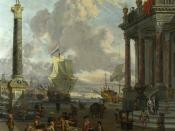Between 1600 and 1800 most of the states of Western Europe were heavily influenced by a policy usually known as mercantilism. This was essentially an effort to achieve economic unity and political control. No general definition of mercantilism is entirely satisfactory, but it may be thought of as a collection of policies designed to keep the state prosperous by economic regulation. These policies may or may not have been applied simultaneously at any given time or place. Trade offered another method to accumulate the bullion (gold or silver formed into bars, ingots, or plates). Generating revenue through trade depended on maintaining a favorable balance that is, exporting more than a nation imported. In a mercantilist system, government played a central role in regulating trade by imposing restrictions on trade. As the production of goods for exchange increased, governments took a more active role in industrial development. New crafts and trades provided work for the idle and lined the pockets of mercantilists who made money by importing raw products and exporting finished goods at significantly higher costs.
Those who wanted to participate in trade and industry needed government backing to succeed, especially in the oceanic trade.


